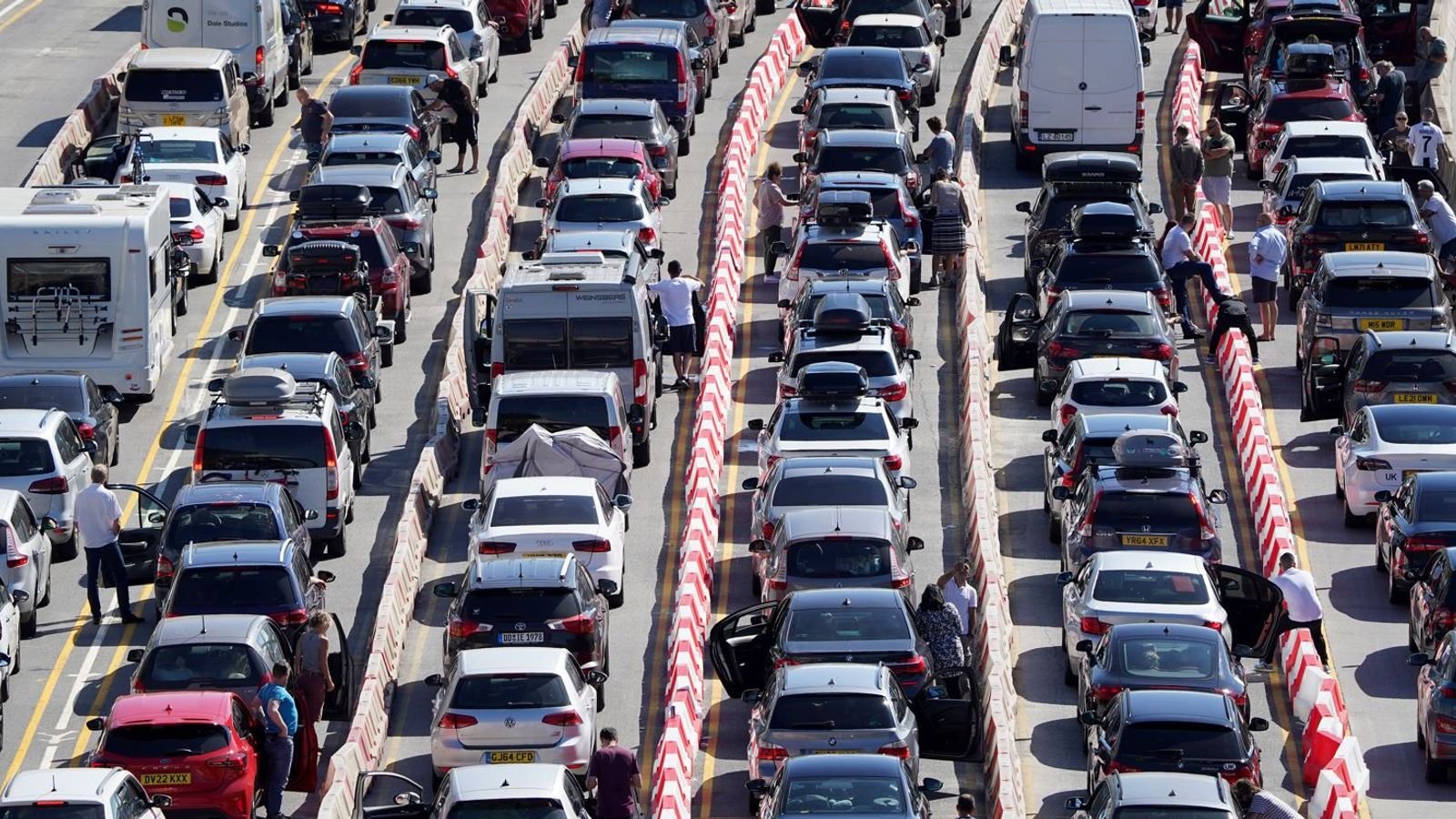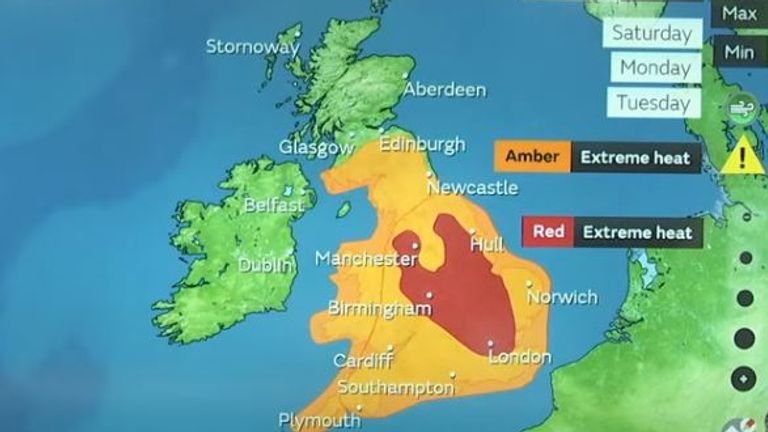Heatwave disruption: Schools close, hospitals cancel appointments and events are scrapped as UK braces for record temperatures

The country is bracing itself for extreme disruption next week, as forecasters predict possible temperatures of 40C (104F) in parts of the country.
Amid warnings that lives are at risk, a “national emergency” has been declared by the UK Health Security Agency and the Met Office has issued its first-ever red warning for extreme heat.
The heatwave is set to peak on Tuesday, with temperatures climbing over the weekend.
Find out the five-day forecast for where you live
Travel delays as tracks ‘bend and buckle’
People are being urged to avoid all non-essential travel and warned of likely disruption to travel by train and car.
A No 10 spokesman said railway speed restrictions may be needed on “some parts of the network next week to manage the hot weather and to avoid any potential damage”.
Very hot temperatures can affect rails, overhead power lines and signalling equipment, as well as “bend and buckle” tracks.
Jake Kelly, of Network Rail, warned that journeys will take “significantly longer and delays are likely as speed restrictions are introduced to keep passengers and railway staff safe”.
Train operators, including Transport for London (TfL), are strongly encouraging customers not to travel on Monday 18 and Tuesday 19 July.
TFL chief operating officer Andy Lord said: “Due to the exceptionally hot weather that is expected next week, customers should only use London’s transport network for essential journeys.
“If customers do need to travel, they should check before they travel as we are expecting there to be some impact to Tube and rail services as a result of temporary speed restrictions we will need to introduce to keep everyone safe.
“It is also vital that customers always carry water at all times with them when travelling.”
Meanwhile, motorists have been advised to try to make their journeys outside of the hottest periods of the day, particularly if they have older cars.
The RAC has warned more drivers will need help as cars overheat, and asked their customers to question whether they really need to make the journey in the first place.
Hospital appointments cancelled
Some hospitals have taken the decision to cancel routine appointments and surgeries due to the risk to both patients and staff due to the predicted extreme heat.
Joe Harrison, CEO of Milton Keynes University Hospital, said on Twitter: “We have taken the decision to stand down routine outpatient appointments and surgery on Monday and Tuesday because many of the patients travelling to these appointments are frail and at increased risk, and due to the unpredictable nature of very high temperatures on demand for emergency care and on care environment.
“We will do all we can to keep wards & departments as cool as possible, but we know this will be a challenge given the very high outside temperature.
“We have solid plans and contingency plans in place and will keep social media channels and our website updated with any changing info.”
With ambulance wait times already on the rise, there have been warnings that things will only worsen during the heatwave, with patients potentially stuck in hot vehicles for hours while waiting for hospital admission.
East Midlands Ambulance Service Director of Operations David Williams warned patients they may face “an extended wait” for an ambulance and urged people to call 999 only as “a last resort”.
NHS data revealed that none of the England’s ambulance services hit crucial response time targets in June.
School closures and sports days cancelled
Some schools in the south of the country may close on Monday and Tuesday due to the extreme weather, and the NEU teaching union has said it will support headteachers taking this decision.
Schools choosing to close their doors have pointed to the potentially dangerous temperatures of classrooms, as well as the risk to both staff and pupils of having to work during the hottest points of day.
Many school sports days scheduled to take place during the hot weather are also being postponed or cancelled.
Some schools have said they will arrange a skeleton staff to keep the buildings open for parents unable to find alternative childcare at short notice.
Some southern nurseries will also be restricting their hours on the hottest days following Public Health England’s guidelines for supporting children in Early Years.
The majority of UK schools are set to break up for the summer holidays later in the week.
Some shops and salons around the country have also advised they will be closing or shutting early on Monday and Tuesday.
Scrapped events
Unprecedented weather conditions have led to many weekend events – including dog shows and summer fetes – being called off, as well as larger scale events at the start of the week.
The British Horseracing Authority (BHA) have called off five meetings – their scheduled fixtures at Beverley and Windsor on Monday and their all-weather cards at Chelmsford and Wolverhampton on Tuesday, along with Southwell’s jumps fixture.






